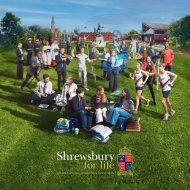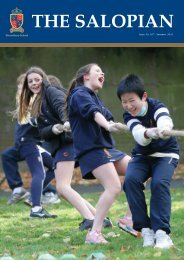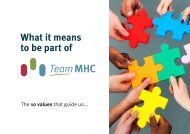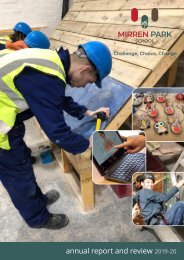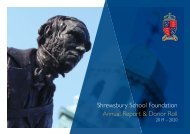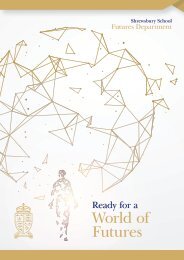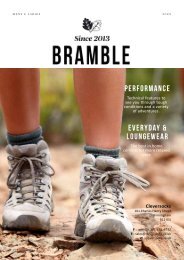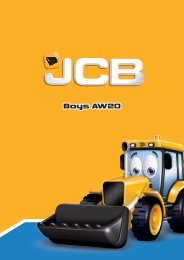Chaigeley Prospects
Chaigeley School takes pride in ‘realising potential’ of all its pupils and provides a personalised curriculum for children and young people along with an integrated therapeutic intervention approach, that aims to focus on self-regulation, building confidence and individual development and outcomes.
Chaigeley School takes pride in ‘realising potential’ of all its pupils and provides a personalised curriculum for children and young people along with an integrated therapeutic intervention approach, that aims to focus on self-regulation, building confidence and individual development and outcomes.
- No tags were found...
You also want an ePaper? Increase the reach of your titles
YUMPU automatically turns print PDFs into web optimized ePapers that Google loves.
CHAIGELEY<br />
SCHOOL<br />
realising<br />
potential<br />
—
Contents<br />
—<br />
Welcome to <strong>Chaigeley</strong> School 4-9<br />
Education with a difference 10-23<br />
Therapeutic Services 24-31<br />
Our pupils 32-35<br />
Stability and Safeguarding 36-37<br />
Referrals and admissions 38-43
Welcome to<br />
<strong>Chaigeley</strong> School<br />
Overview:<br />
<strong>Chaigeley</strong> Educational Foundation (<strong>Chaigeley</strong> School) is a Registered<br />
Charity governed by a voluntary committee of Director Trustees and<br />
managed on their behalf by the Principal. <strong>Chaigeley</strong> School has been<br />
helping pupils with behavioural, emotional and social difficulties since<br />
1946. <strong>Chaigeley</strong> provides quality individualised provision for boys and<br />
girls aged 8 to 16 through both day and residential education and care.<br />
<strong>Chaigeley</strong> School takes pride in ‘realising potential’ of all its pupils and<br />
provides a personalised curriculum for children and young people along<br />
with an integrated therapeutic intervention approach, that aims to focus<br />
on self-regulation, building confidence and individual development and<br />
outcomes.<br />
4
“We offer our young people<br />
a consistent environment<br />
and structure which will<br />
enable them to re-engage<br />
in education and develop<br />
a sense of self-worth<br />
through achievement”.<br />
5
Our Vision for Children’s Future:<br />
<strong>Chaigeley</strong> School offers a modern and flexible approach to meeting the<br />
needs of young people who experience Social Emotional and Mental<br />
Health (SEMH) needs. We do not describe our provision as ‘special’ as we<br />
believe that we are a ‘specialist’ environment for young people who find<br />
effective communication more challenging than most. This specialism<br />
holds it foundation in the belief that all behaviour and reaction is a form<br />
communication and a wider belief that all young people have amazing<br />
potential and want to be happy, independent and respected members<br />
of society.<br />
Girls and boys who attend <strong>Chaigeley</strong> School can sometimes find<br />
appropriate communication difficult and have often fallen into<br />
inappropriate patterns of behaviours in order to express their frustration,<br />
anxiety or fear. The staff are highly skilled and experienced at breaking<br />
down these patterns of behaviour and can recognise the barriers that<br />
young people build that slow down or halt their full potential being<br />
realised. Through a mix of individualised curriculum approaches,<br />
therapeutic support and respite care and family services, we aim to<br />
achieve the best possible outcomes for young people in our care.<br />
6
Our Aims and Values:<br />
We provide an ethos that is based on the belief that the secret of happiness is choice and the best way to<br />
increase choice is through educational experiences. The aim for all young people is to make this ‘radius<br />
of choice’ as wide as possible for the individual, which means access to a broad and balanced curriculum<br />
that accesses the full range of qualifications both academic and vocational; which lead to further<br />
education, training and employment.<br />
<strong>Chaigeley</strong> aims to prepare young people for modern life through the education of both the mind and heart,<br />
creating focussed young people who can communicate their needs in a productive and safe way and who<br />
have the confidence to achieve their life goals and benefit from a position of choice.<br />
7
Partnership Working:<br />
<strong>Chaigeley</strong> School has an experienced and<br />
dedicated team that is able to offer support,<br />
advice and training to a wide range of partners<br />
across England and Wales. We provide direct<br />
support in schools across the North West of<br />
England. The support provides help with policy,<br />
practice and training to increase awareness<br />
of behavioural and therapeutic techniques.<br />
Often this support extends to work around<br />
planning for individual young people to help<br />
them maintain placements but it also offers full<br />
staff INSET support to ensure that pupils are<br />
supported holistically and consistently.<br />
8
“The work on attachment and its<br />
importance put into perspective<br />
why some of the children within<br />
this school potentially display<br />
negative behaviour or poor<br />
communication.<br />
It has been great to forge such<br />
positive links with <strong>Chaigeley</strong><br />
School and we have enjoyed<br />
working with your staff. We<br />
look forward to continuing to<br />
develop an even closer working<br />
relationship between the two<br />
schools for the benefit of the<br />
children and the community.”<br />
Susan Robinson, Headteacher.<br />
Thelwall Junior School.<br />
<strong>Chaigeley</strong> School is a member<br />
of the ‘engage in their future’<br />
network of schools. This is a<br />
national network of leaders in<br />
education who work within the<br />
SEMH sector or who have an<br />
interest in improving outcomes for young people<br />
who experience complex behavioural issues.<br />
The network not only advocates the best<br />
outcomes for young people, but also is directly<br />
involved in influencing change in respect of<br />
practise, enabling outcomes to be furthered<br />
for young people with SEMH. The Principal of<br />
<strong>Chaigeley</strong> School is the National Chair of this<br />
network and this ensures that <strong>Chaigeley</strong> School<br />
is at the forefront of any up to date initiatives<br />
and often is central to supporting sector leading<br />
practice.<br />
9
Education with<br />
a difference<br />
Our Curriculum:<br />
We offer a very wide choice of curriculum at <strong>Chaigeley</strong> School. The<br />
timetable aims to be flexible and comprehensive to meet the academic as<br />
well as the vocational needs of our pupils. Each class group, of no more<br />
than seven pupils, has a qualified class teacher and at least one dedicated<br />
teaching assistant. Specialist teachers deliver specific subjects and are<br />
also skilled in working with pupils experiencing behavioural, emotional and<br />
social difficulties.<br />
We have structured timetables to best meet the individual needs of each<br />
pupil, depending on their personal circumstances. Therefore, up to 26<br />
hours of education a week are provided and this can incorporate lesson<br />
time in school, sports sessions, outdoor education and/or some sessions of<br />
independent study work undertaken outside of school.<br />
10
“Teaching is nearly always<br />
good with some which is<br />
outstanding. Teaching is<br />
engaging and enjoyable.<br />
This enables pupils to learn<br />
quickly, as was evidenced by<br />
the good quality of work seen<br />
in pupils’ books and folders”.<br />
OFSTED Inspection Report 2014<br />
11
We have divided the school into needs based HUB<br />
groups: Lower School and Upper School.<br />
Lower School - Key Stage 2 and 3:<br />
Key Stage 2 and 3 offers a broad, balanced and enriched curriculum<br />
which is underpinned by the key skills of speaking and listening, reading,<br />
writing and mathematics across all subject areas. This ensures that<br />
the children are given opportunities to learn, build on and develop<br />
new skills. Reading is given a high priority. Children are heard reading,<br />
using an enjoyable and effective Rapid Reading Scheme that leads to<br />
improvement by closing the gap.<br />
Our provision is delivered using nurture principles; as a Nurture Group,<br />
we provide a carefully planned day, where there is a balance of learning<br />
and teaching, affection and structure within a home-like atmosphere.<br />
The emphasis is on emotional growth – focusing on offering broad-based<br />
experiences in an environment that promotes security, routines, clear<br />
boundaries and carefully planned, repetitive learning opportunities.<br />
12
Children are exposed to a range of subjects and activities that allow them to experience different topics<br />
and learning styles. This includes:<br />
Eco Club<br />
Design Technology<br />
(Resistant Materials and<br />
Food Technology)<br />
Art<br />
Drama<br />
Music<br />
Craft<br />
History / Geography<br />
PSHE<br />
RE<br />
ICT<br />
PE / Games<br />
ASDAN<br />
Learning experiences for our children are further enhanced through visits and trips. The WW2 topic<br />
included visits to Stockport Air Raid Shelters, Chester Military Museum and the Imperial War Museum.<br />
13
Upper School Key Stage 3/4:<br />
Upper School provides an equally nurturing and caring<br />
environment to Lower School but offers the opportunity for<br />
young people to experience a more ‘traditional’ education<br />
experience. Pupils are placed in form groups, and for the most<br />
part these reflect year age groups but there can be flexibility<br />
to enable more pupils with similar interests and needs to be<br />
placed together.<br />
Lessons are delivered by specialists in the curriculum areas<br />
and mostly pupils move from class to class to engage in<br />
learning, providing a more ‘traditional’ feel to the learning<br />
experience. Support is provided directly to all to enable the<br />
diversity of pupils needs to be supported. All form groups have<br />
a pastoral Teaching Assistant that stays with the group for the<br />
majority of the timetable, in addition support is also provided<br />
in key areas of the curriculum especially Numeracy and<br />
Literacy by specialist Teaching Assistants who work closely<br />
with the specialist teacher to ensure outstanding outcomes in<br />
these areas remain a priority.<br />
14
<strong>Chaigeley</strong> provides a range of nationally recognised qualifications of all<br />
levels from pre-entry-level to GCSE and BTEC. Each course is tailored to the<br />
individualised needs and ability of each young person. Qualifications offered to<br />
the young people include:<br />
English<br />
Maths<br />
Science<br />
ICT<br />
The Arts, including Art,<br />
Music and Drama<br />
Physical Education<br />
History<br />
Geography<br />
Design Technology<br />
Hospitality and Home<br />
Care Skills<br />
Religious Education<br />
ASDAN<br />
Outdoor Education<br />
- Duke of Edinburgh<br />
- John Muir Trust<br />
15
Vocational Courses / Training and<br />
Development:<br />
We recognise the importance of enabling every young person<br />
who attends <strong>Chaigeley</strong> School to engage with vocational<br />
training, which allows them to enter the workplace and<br />
gain meaningful employment that will ultimately facilitate<br />
independent living.<br />
It is important for KS4 pupils to leave school fully prepared with<br />
the skills required for life at college / training or in the workplace.<br />
All KS4 pupils have the opportunity to engage in Work Related<br />
Learning activities and externally accredited courses. Timetables<br />
can be personalised to meet the needs of individuals. All KS4<br />
pupils have the opportunity to experience taster courses in a<br />
range of vocational subjects at local colleges. Year 11 pupils<br />
undertake a block two week work experience placement which<br />
can be extended for individuals if necessary.<br />
Pupils can also access Independence Advice and Guidance<br />
provided by the local careers service; students begin to access<br />
this support in KS3.<br />
16
Outdoor Education:<br />
We recognise the importance of enabling every young person<br />
and <strong>Chaigeley</strong> School recognises that in order to support<br />
complex needs and in particular attachment disorders,<br />
developing an appropriate pattern of risk taking is key to<br />
enhancing confidence in both personal objectives and as<br />
well as learning in the more formal classroom environments.<br />
Our outdoor educational programme aims to enable young<br />
people to overcome their fears, face challenges and develop<br />
their skills and confidence. On occasions, we will organise<br />
overnight trips, which actively promotes socialisation, cooperation<br />
and positive interaction with both peer and adults.<br />
There are opportunities for pupils to learn, participate in and<br />
enjoy sports and outdoor adventurous activities.<br />
Young people work towards the Duke of Edinburgh Award;<br />
this is a nationally recognised and certified award that can be<br />
achieved by completing a personal programme of activities<br />
in four or five of the following:<br />
Volunteering - helping<br />
someone, your community or<br />
the environment.<br />
Physical - becoming fitter<br />
through sport, dance or fitness<br />
activities.<br />
Skills - developing existing<br />
talents or trying something new.<br />
Expedition - planning,<br />
training for and completing an<br />
adventurous journey.<br />
Residential staying and<br />
working away from home as<br />
part of a team.<br />
The Duke of Edinburgh Award is<br />
very popular at <strong>Chaigeley</strong> with<br />
activities as varied as orienteering,<br />
climbing, canoeing, mountaineering<br />
and sports.<br />
17
Outreach Welfare Support Programme:<br />
The outreach service provides tailored support to children who are<br />
currently out of school for a range of complex reasons. Each pupil is<br />
provided with a timetable and support package that reflects their<br />
immediate capacity to engage with education and that also supports<br />
the family environment. The overall aim of the Outreach provision is to<br />
reintegrate the pupil back into full time education as quickly as possible.<br />
There is close liaison with other agencies and service providers that<br />
have contact with the pupil to ensure a fully integrated approach is<br />
established and maintained. Our staff are dedicated, experienced and<br />
qualified professionals who utilise their skills and learning strategies<br />
to gain trust and build up meaningful working relationships with each<br />
young person. The foundation of this service is the building of trust<br />
between child, parents / carers and school.<br />
Each child will receive one to one support with a timetable and<br />
curriculum designed to encourage greater participation in school work.<br />
The sessions are delivered in a flexible and friendly manner in more<br />
informal circumstances within the pupil’s local area, for example, a<br />
Library, Children’s centres or if appropriate, the child’s home.<br />
18
Each young person will have a dedicated<br />
outreach worker who will act as their mentor<br />
throughout the duration of their programme;<br />
this will include the transition period when<br />
joining the main school. There is a close link<br />
between the outreach timetable and that of<br />
the main school. Each young person will have<br />
bite size school sessions integrated into their<br />
programme to develop relationships and<br />
understanding of school life at <strong>Chaigeley</strong>. These<br />
sessions can include participating in class, as<br />
well as offsite visits that are part of the Duke of<br />
Edinburgh programme. In addition, as part of<br />
the Outreach service we offer Welfare support<br />
for the family, this support will continue even<br />
when the young person is integrated back into<br />
full time education.<br />
19
Learning Environment:<br />
The staffing at <strong>Chaigeley</strong> School includes a<br />
Principal, two Heads of School a range of<br />
specialist teachers and a team of specialist<br />
teaching assistants and mentors. Class sizes<br />
are limited to seven children to enable the<br />
ratio to effectively support learning for each<br />
child. Every class has a qualified teacher or<br />
tutor leading the session with at least one<br />
teaching assistant that specialises in behaviour<br />
management, holding a consistent pastoral<br />
role for the form group. Core Learning areas<br />
also have teaching assistants who work closely<br />
with the specialist teachers to enable more in<br />
depth support in key areas of the curriculum.<br />
20
The learning environment is directly supported by the<br />
schools Pupils Support Service. This is staffed by a<br />
team of mentors who are skilled in diffusing crisis and<br />
work to ensure that learning remains central to the<br />
school day for all pupils. Pupils are rewarded for self–<br />
regulating their behaviours and choosing to seek<br />
the support of the Pupil Support Service who may<br />
support the child 1-1 when returning to the classroom,<br />
offer an alternative environment to complete the work<br />
or offer some guidance / mentorship should the issue<br />
be of a more personal or wider context for the child.<br />
If the crisis is severe for the child, the support team<br />
can offer the direct services of the Therapeutic Team,<br />
which includes direct therapeutic interventions within<br />
a therapeutic environment called ‘The Loft’.<br />
In school, we also have 3 staff trained as tutors of the<br />
Team Teach approach. This training is for all members<br />
of staff that work directly with the young people who<br />
display challenging behaviours.<br />
21
Working Together with Parents and Carers:<br />
At <strong>Chaigeley</strong> School, we promote close working relationships with<br />
parents, carers and all key personnel involved with the care and<br />
education of young people. Progress for young people is communicated<br />
daily to parents and carers through the sharing of a ‘progress slip’ given<br />
to young people at the end of each day. These focus on a positive for the<br />
young person, but may also review concerns to allow parents and carers<br />
to engage in a joint strategy to aid in maintaining progress.<br />
Some parents / carers prefer to have phone contact in addition to the<br />
progress slip and all pastoral TA’s ( there is one in every form group ) will<br />
make a weekly phone call to all parents / carers but will, if requested,<br />
increase the regularity of these calls, if it supports greater engagement<br />
with parents, carers and young people. Formal report updates are<br />
provided on a termly basis. Parents, carers and all stakeholders are<br />
invited to respond to these reports and if they wish they are able to visit<br />
the school to discuss the content of the report.<br />
<strong>Chaigeley</strong> School also holds annual open days for year 11 pupils, the<br />
community, and commissioning bodies to promote an open access<br />
approach to the schools and pupils development.<br />
22
Keeping Children and Young<br />
People Safe:<br />
<strong>Chaigeley</strong> School is proud of its effective and<br />
comprehensive safeguarding procedures. The<br />
Principal sits on the local safeguarding children’s<br />
executive committee and this ensures that<br />
developments both locally and nationally are<br />
always incorporated into staff CPD and school<br />
policies.<br />
The school takes great care to ensure that<br />
the staff team is regularly updated with all<br />
policies that relate to safeguarding, including<br />
the recent additional guidance relating to the<br />
Prevent Strategy and Keeping Children Safe<br />
in Education issued by the DfE. Training is led<br />
by the designated team for all members of<br />
staff and governors, this is supplemented by<br />
the local police force, specialist organisations<br />
and the LADO team. All of which, provides a<br />
comprehensive approach to meet the priority<br />
the school places on keeping both children and<br />
staff safe.<br />
The school’s PSHE programme is embedded<br />
throughout the ‘virtual 24hr curriculum’, so<br />
that all pupils have access to advice and<br />
development both within school and care<br />
environments. Young people also engage in<br />
Assembly every week and this regularly deals<br />
with issues that encourage the pupils to reflect<br />
on the ethos and expectations of the school.<br />
‘ECO School’:<br />
<strong>Chaigeley</strong> School enjoys ECO schools status and<br />
we are constantly driving initiatives to reduce the<br />
use of paper and energy that can be replaced<br />
through alternative sources. We advocate the<br />
use of public transport for staff and pupils both<br />
to secure independence skills but also to reduce<br />
our carbon foot-print. These outcomes are<br />
shared with all pupils and staff, however, the risk<br />
assessment and needs and wishes of individuals<br />
are always considered.<br />
23
Therapeutic<br />
Services<br />
Overview:<br />
<strong>Chaigeley</strong> School offers an integrated therapeutic<br />
service to young people with a wide variety of<br />
needs. These needs are sometimes complex and<br />
enduring trauma, and may be expressed through<br />
a range of troubling behaviours, such as Sexual<br />
or violent offending, anti-social behaviour,<br />
Challenging behaviour, and Risk-taking and<br />
self-defeating behaviours.<br />
Some of our young people may have problematic<br />
attachment patterns, and/or present with a range<br />
of other needs including learning difficulties,<br />
underlying mental health problems, autistic<br />
spectrum conditions and ADHD.<br />
<strong>Chaigeley</strong>’s therapeutic team works with young<br />
people in establishing a lasting therapeutic<br />
relationship. Every young person placed with us<br />
is allocated to a member of the therapeutic team;<br />
who then works with the young person, education<br />
staff, parents and external agencies supporting<br />
and directly contributing to their therapeutic<br />
needs.<br />
24
Our Therapeutic Model:<br />
<strong>Chaigeley</strong> School believes that what is needed therapeutically does not<br />
reside in an individual therapist, but in a multi-disciplinary approach.<br />
Each young person at <strong>Chaigeley</strong> School has an integrated team of<br />
professionals made up from the therapy, counselling and learning<br />
support working around them, to provide a holistic and comprehensive<br />
service. The therapeutic input for each young person is bespoke to them,<br />
drawing on a wide understanding of child behaviour.<br />
Our model of therapeutic input is attachment and trauma-informed:<br />
Valuing attachment and belonging<br />
Providing a network of supportive and challenging relationships<br />
Promoting the empowerment and giving appropriate responsibility<br />
Encouraging a culture of enquiry and curiosity<br />
Holistic, planned approach keeps in mind the need to assess, manage<br />
and reduce risks that the young people face or presents with.<br />
25
<strong>Chaigeley</strong> therapeutic services provide:<br />
Assessment and risk management<br />
Psychological therapies<br />
Counselling<br />
Learning support<br />
On-going review<br />
Training and practice development<br />
Individual consultancy<br />
Specialist advice and personal development<br />
To enhance our integrative approach and promote continuity, our team members are employed directly<br />
by <strong>Chaigeley</strong> School. They are all registered with their respected accrediting bodies. Our commitment is to<br />
establish a therapeutic relationship as the basis to our work and allow the young person’s experiences to<br />
be central to this. We recognise that each young person is actively trying to make sense of their current and<br />
past experiences.<br />
26
Therapeutic Team:<br />
The therapeutic team is led by:<br />
David Taransaud - Clinical Lead<br />
David Taransaud is a psychotherapeutic counsellor<br />
(UKCP), consultant, author, and trainer with over 15<br />
years’ experience working with challenging youth. He is<br />
the author of: ‘I, Monster: positive ways of working with<br />
challenging teens through understanding the adolescent<br />
within us’ (2016) and ‘You Think I’m Evil: practical<br />
strategies for working with rebellious and aggressive<br />
adolescents’ (2010).<br />
He has written many articles concerning ‘Attachment’<br />
(the John Bowlby’s Foundation magazine), ‘Children and<br />
Young People’ and ‘Play Therapy Magazine’.<br />
David also worked as a foreign consultant in Karachi<br />
(Pakistan) and travelled to Kitgum (Uganda) where<br />
he independently set up an Art Therapy service in an<br />
orphanage for former child soldiers and young people<br />
affected by conflict and trauma.<br />
27
Speech and Language Therapy:<br />
The School engages the services of a Speech<br />
and Language Therapists (SaLT) who work with<br />
pupils that have difficulties with communication,<br />
as well as providing training to staff. Speech and<br />
language therapy is integrated within the school<br />
and takes place in the classroom; making use of<br />
the learning environment.<br />
SaLTs assess and treat speech, language and<br />
communication problems in young people<br />
and help them communicate better. Using<br />
specialist skills, SaLTs work directly with pupils<br />
and their carers and provide them with tailored<br />
support. They also work closely with teachers<br />
and other health professionals, such as doctors,<br />
nurses, other allied health professionals and<br />
psychologists to develop individual treatment<br />
programmes.<br />
28
Pupil / Learning Support:<br />
The pupil support team are an experienced<br />
group of staff members who are on duty every<br />
day. They carry out practical tasks, ensuring all<br />
pupils are safe and accounted for and support<br />
specific lessons. They are also on hand to<br />
deal with any issues which may arise during<br />
the school day. These may include: providing<br />
a ‘time-out’ facility for distressed or anxious<br />
pupils, mediating between pupils, helping pupils<br />
to reflect upon their behaviour, and working<br />
individually with pupils - either in the classroom<br />
or within a designated work area. In addition,<br />
they assist with escorting pupils to medical and<br />
dental appointments, as well as attending multiagency<br />
meetings.<br />
29
Staff Support and Training<br />
Support for staff is continuous to enable them to remain<br />
robust and aware of developments in the field of SEMH.<br />
Continuous Professional Development (CPD) occurs every<br />
two weeks with staff providing updates in their various fields<br />
to colleagues as well as input from outside agencies. This has<br />
helped the staff become aware of the growing needs of our<br />
sector such as Prevent and CSE strategies and the developing<br />
research on Foetal Alcohol Disorders for example.<br />
Support is also provided by the therapeutic team, who offer both training on a group basis and individual<br />
mentoring sessions to help staff maintain a robust and resilient approach to the challenging work they are<br />
so effective at undertaking.<br />
Alongside this all staff have regular supervision to enable them to celebrate their work and develop<br />
strategies to further improve the outcomes for pupils with the direct support of their senior leadership<br />
team.<br />
Performance management routines are also in place to enable individuals to take ownership of their<br />
professional direction.<br />
The staff team at <strong>Chaigeley</strong> are committed and experienced and the strength of our support networks<br />
means we have an incredibly secure team with excellent levels of retainment, which leads to better<br />
outcomes for both staff and pupils.<br />
30
Evaluation of Progress<br />
<strong>Chaigeley</strong> School is proud of it’s<br />
ability to help pupils achieve<br />
outstanding outcomes. These<br />
outcomes come in various forms.<br />
Pupils not only excel in academic<br />
areas including GCSE results but<br />
also in the ongoing development of<br />
social skills.<br />
<strong>Chaigeley</strong> measures the<br />
development of social skills using<br />
a Social Outcomes Wheel, which<br />
helps create a baseline of need and<br />
provides focus for key areas such as<br />
empathy, task orientation and self<br />
awareness. Targets are devised to<br />
work alongside the school’s PSHE<br />
curriculum and provide additional<br />
focus for mentoring sessions<br />
and in some cases therapeutic<br />
interventions.<br />
Progress is measured termly for all pupils but if necessary<br />
and required the frequency of assessments can be<br />
increased to enable pupils to maximise their outcomes.<br />
Pupils on the Outreach programme have detailed<br />
evaluation for every session and reviews<br />
are conducted every half term.<br />
31
Our pupils<br />
Results and Achievements:<br />
“ Key Stage 2 pupils make good progress in<br />
reading, writing and mathematics often<br />
from low starting points. Pupils settle<br />
quickly when they arrive and this enables<br />
staff to assess pupils’ levels of achievement<br />
and provide work which is closely tailored<br />
to their needs. One pupil’s comment<br />
summed up the feelings of others: ‘I really<br />
love it here. Teachers understand my<br />
problems and have helped me to work hard<br />
and be proud of the work I do”.<br />
Ofsted Report (2014)<br />
32
“ Having spent a few years with L being more out<br />
of school, than in at his local primary, and me<br />
getting very little support. I felt relieved when L<br />
finally made it to <strong>Chaigeley</strong>. I remember feeling on<br />
our first visit to see if he was suitable, that he was<br />
finally in a school with people who understood<br />
him and wanted to help him; a school where he<br />
wouldn’t just be judged on his bad behaviour,<br />
and where he wasn’t just the ‘naughty boy’. But<br />
a school and staff that saw and treated him as a<br />
person, an individual and encouraged him to reach<br />
his potential.<br />
I cannot thank staff enough for all the support they<br />
have given to L and myself, in times that have been<br />
difficult. Nothing gives me more pride than to see L<br />
getting ready to leave school with a future ahead of<br />
him and him achieving far more than I ever thought<br />
possible”.<br />
Michelle, Parent<br />
33
Results in 2015:<br />
Of the Pupils who started placements in key stage 3 or before :<br />
- 100% obtained at least 5 A* to C GCSE results or equivalent (BTEC).<br />
- 100% obtained at least 9 GCSE results or equivalent.<br />
100% of the school leavers achieve recognised qualifications<br />
Majority of key stage 3 pupils will complete AQA awards and entry level qualification<br />
Bronze or Silver Duke of Edinburgh has been achieved by Key Stage 4<br />
English, 71.4% GCSE Maths, 100% GCSE and Science 85.7% GCSE 2015 Year 11<br />
Reading ages consistently improved across the school with all pupils successfully closing the gap<br />
between baseline assessment and current position.<br />
100% attendance to therapy and counselling services.<br />
Exclusions:<br />
At <strong>Chaigeley</strong> our policy is not to permanently exclude children. In most cases, if the young person has a<br />
crisis that requires time away from the school environment the pupil will continue their education with 1:1<br />
support in an outreach capacity, until they are ready to reintegrate fully with the school.<br />
34
Case Study - AB Year (Year 11 Pupil):<br />
AB came to <strong>Chaigeley</strong> in Year 10 following as long history of school<br />
placement breakdown and non-attendance for over 6 months.<br />
During the referral process AB made it clear that his ambition was to<br />
work in the building trade with his father and that he did not value<br />
any other aspect of ‘school’. We agreed between school, parents<br />
and AB to formulate a solution that would get him exactly where he<br />
was looking to get to in terms of his ambitions.<br />
AB attended school and agreed to access a full curriculum alongside some therapeutic intervention. As<br />
the therapeutic intervention began to have an impact, it became more difficult for him to maintain the<br />
environment within school. His ability to self-regulate his emotions and actions become more challenging<br />
leading to outbursts of damage of school property throughout year 10. At the beginning of year 11, it<br />
was clear that AB was not able to sustain safe behaviours on school site, AB moved to an individualised<br />
curriculum that focused on Literacy / Numeracy and ICT delivered by our Outreach Team and 3 days of<br />
work experience with a construction company following a C&G qualification route that was supported<br />
from within the school.<br />
The result was that this allowed AB to retain a placement in school, follow his ambitions and engage with<br />
core subject areas at GCSE level. It also maintained contact with the therapeutic interventions for both<br />
pupil and family.<br />
35
Stability and<br />
Safeguarding<br />
Stability is one of the core aims of <strong>Chaigeley</strong> School. The focus on the<br />
young person’s need for stability does not remain solely within the school<br />
environment; we work closely with parents, carers and other agencies to<br />
ensure that the appropriate foundations are in place to support the holistic<br />
needs of the child. This includes home visits that provide guidance and<br />
support for the family as a whole.<br />
<strong>Chaigeley</strong> School has a long history of supporting vulnerable young people<br />
who experience SEMH and our outcomes are excellent given the starting<br />
points we build foundations from. The ethos of the school is to ‘realise<br />
potential’ within the individual and we do this by assessing their abilities,<br />
ambitions and needs and then supporting the best outcomes through<br />
skilled interventions that allow individuals to flourish.<br />
36
The staff team is experienced and have been working together as a<br />
specialist team for many years; we provide excellent stability with a very<br />
low turnover of staff in both school and care environments. This ensures<br />
that pupils have stability in key relationships around school and care. The<br />
stability provided by these key relationships allows us to approach the<br />
curriculum design individually.<br />
All pupils understand the need to address core subjects as a school but<br />
supplementary subjects are offered in response to interest, ability and<br />
ambitions and this maintains a child centred approach which allows the<br />
child to achieve more successfully.<br />
Respite Service<br />
In order to support pupils within both the school and their community<br />
<strong>Chaigeley</strong> can offer a respite service for young people and families who<br />
may need some specialist support due to the complex nature of their<br />
environment and needs. This provision is staffed by experienced care staff<br />
who work closely with the family and carers to safeguard the experience<br />
of respite. Respite is provided on a planned basis and the young person is<br />
always included in the planning process, matching staff skills with interests<br />
and abilities so that the time spent on school site is positive and supportive.<br />
37
Referrals and<br />
admissions<br />
Overview:<br />
Most referrals come to <strong>Chaigeley</strong> School via the local authority route.<br />
<strong>Chaigeley</strong> has some very positive links with local authorities across England<br />
and Wales. Our long standing relationships are built upon trust and the<br />
delivery of meaningful and positive outcomes for young people.<br />
We can discuss referrals with parents and carers also and are always<br />
happy to share our provision and offer support where we can. However, it<br />
is always advisable to incorporate the relevant local authority wherever<br />
possible.<br />
38
Process and Procedure:<br />
Stage 1 - Initial Referral and<br />
Assessment<br />
We can accept an initial request to assess a<br />
placement from either a parent / carer / local<br />
authority officer or private organisation in the<br />
following ways:<br />
By Letter :<br />
Referral Officer, Chiageley School, Lymm Road,<br />
Warrington, WA4 2TE<br />
By Phone : 01925 752357<br />
Via Email : admin@chaigeley.org.uk<br />
39
In order to be fully able to assess the effectiveness of a placement for the<br />
individual young person, we normally ask for the following reports to be<br />
shared:<br />
1. Full referral information.<br />
2. Statement of SEN needs or Education Health and Care Plan (EHCP).<br />
There may not be one in place, if not, we would need to know.<br />
3. A copy of the most recent school report written by the last or current<br />
education provider.<br />
4. A copy of the most recent report written by the last or current Care<br />
provider (if relevant).<br />
5. Any copies of most recent assessment reports.<br />
6. Copies of most recent risk assessment, if available.<br />
7. Name and address of current most recent provisions including<br />
contact names.<br />
8. Name, address and contact details for parents / carers.<br />
9. Confirmation of funding in place.<br />
40
The information opposite will be fully considered by<br />
the Principal and the senior leadership team; this will<br />
include an Impact Assessment of the referred young<br />
person on the current young people on roll. If it is<br />
assessed that we are able to meet the needs of the<br />
referred young person, then we would confirm this with<br />
the individual referral agency / LA.<br />
If the local authority is not aware of the referral, we<br />
would at this point inform them of the situation and<br />
this may require a planning or review meeting to be<br />
held before moving on with the referral process. This<br />
confirmation will include details of required fees for the<br />
placement but this will be subject to completion of the<br />
remaining stages of referral.<br />
This will normally be completed within a week of the<br />
referral information being received in full. (Fees will<br />
need to be agreed before moving on to Stage 2).<br />
41
Stage 2 - Initial Visit - Off Site<br />
The next stage of the referral process is for the Principal / senior team<br />
member to meet with the young person and parents / carers. This is<br />
normally undertaken off site in order to provide a safe environment for<br />
the young person / parent / carer. The purpose of this initial meeting is<br />
to share the ethos of <strong>Chaigeley</strong> School with the young person / parents /<br />
carers, enabling them to consider the provision on offer and offering an<br />
opportunity for them to share with us what they are hoping to achieve<br />
from the placement.<br />
During the meeting, an assessment will be made, as to whether the<br />
young person / parents / carers are willing to engage with the school at a<br />
suitable level to enable positive outcomes to be realistically achieved. If<br />
this is deemed appropriate then the referral will be progressed to stage<br />
3. If Stage 2 results in an assessment that shows that the young person<br />
or parent / carer is not yet ready to engage with the school on offer, then<br />
this will end the referral process and any offer of a placement may be<br />
retracted.<br />
42
Stage 3 - School Visit<br />
During this stage the young person will be<br />
invited to visit the school and meet key staff<br />
members, other young people and gain an<br />
awareness of the physical site and the support<br />
network provided.<br />
At the end of the visit, the young person will be<br />
asked to consider the prospect of attending<br />
<strong>Chaigeley</strong> and it is explained what the possible<br />
start dates may be, subject to transport<br />
arrangements usually. The young person is then<br />
asked to consider the placement over night<br />
/ weekend, if a Friday. In some cases young<br />
people sometimes need more than one visit, so<br />
this Stage can be repeated if necessary.<br />
to take up a place at <strong>Chaigeley</strong>, following their<br />
initial meetings and visits. <strong>Chaigeley</strong> School<br />
require that the young person confirms they<br />
are willing to attend before a placement can be<br />
confirmed. The placement then starts when the<br />
contract agreement and transport provision<br />
have been secured. All new placements are<br />
reviewed after 6 weeks or within the first term.<br />
Stage 4 - Confirmation of Place<br />
Following Stage 3, a member of the senior team,<br />
usually the Principal, will call the young person,<br />
parent / carer and ask them if they are willing<br />
43
CHAIGELEY<br />
SCHOOL<br />
realising potential<br />
—<br />
<strong>Chaigeley</strong> School<br />
Lymm Road, Thelwall<br />
Warrington WA4 2TE<br />
T 01925 752357 or 756786<br />
F 01925 757983 or 758212<br />
E admin@chaigeley.org.uk<br />
www.chaigeley.org.uk




